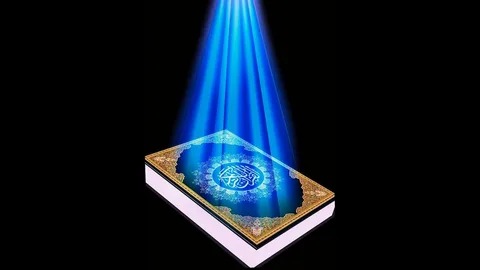In the realm of Islamic theology, the Quran serves as the ultimate source of guidance and wisdom. It addresses various aspects of life, including spiritual entities that often evoke curiosity and intrigue. Among these entities are the enigmatic beings known as “Jinns.” In this comprehensive exploration,in this article on Arabian Tongue website we will delve into What Are Jinns in Quran, unraveling their nature, origin, and significance. Join us on this captivating journey through the mystical world of Jinns.
Unveiling the Enigma: What Are Jinns in the Quran?

The Quran, being the holy book of Islam, offers profound insights into the world of Jinns. Let’s start our journey by understanding how these supernatural beings are introduced in the Quran.
The term “Jinn” is mentioned numerous times throughout the Quran, but what does it actually mean? Let’s decipher the linguistic roots and implications of this term, To comprehend the nature of Jinns, it’s crucial to explore their origin, as depicted in the Quran.
- Creation of Jinns: According to the Quran, Jinns were created from smokeless fire. This unique origin sets them apart from humans and angels, creating an aura of mystique around their existence.
- The Attributes of Jinns: Jinns, as described in the Quran, possess distinctive characteristics that distinguish them from other creatures.
- Invisibility and Shapeshifting: One of the most intriguing aspects of Jinns is their ability to remain invisible to humans and their capacity to change form at will. The Quran elaborates on these extraordinary attributes.
- Free Will and Accountability: Unlike angels, Jinns have been bestowed with free will, making them accountable for their actions. The Quranic verses shed light on the moral responsibilities of Jinns.
- Interactions with Humans: The Quran also narrates instances where Jinns interact with humans, often influencing their lives in subtle ways.
- Jinns as Tempters: Some Jinns are known to tempt and misguide humans. The Quranic stories of temptation and resistance provide valuable lessons.
- Jinns as Believers: Interestingly, the Quran acknowledges that there are righteous Jinns who believe in God and follow His guidance. These narratives offer a unique perspective on faith.
- Significance and Role of Jinns: Jinns play a significant role in the grand tapestry of the Quranic narrative. Understanding their purpose and significance is essential.
- Test of Faith: The Quran portrays Jinns as part of God’s plan to test the faith and devotion of humans. Their interactions with mankind serve as trials and lessons.
- Mystical Healers: Some Islamic traditions mention Jinns as mystical healers. We explore the Quranic references that hint at their potential role in matters of health and well-being.
Surah Jinn in the Quran

In the rich tapestry of the Quran, Surah Jinn stands as a unique and enigmatic chapter that delves into the world of supernatural beings known as Jinn.
Surah Jinn, which translates to “The Chapter of Jinn” in English, is the 72nd chapter of the Quran. It is a relatively short chapter consisting of 28 verses. Surah Jinn provides valuable insights into the nature and existence of Jinn, beings created by Allah from smokeless fire, distinct from humans and angels.
Recommend: Juz Amma Surahs List .
The Essence of Jinn
Surah Jinn begins by emphasizing the supernatural origin of Jinn, emphasizing that they, like humans, possess free will. This unique quality sets them apart from angels, who lack free will, and humans, who are created from clay. The chapter serves as a reminder that the Jinn, like humans, are accountable for their actions.
A Spiritual Invitation
The Surah extends an invitation to the Jinn to embrace Islam and submit to the will of Allah. It highlights the significance of recognizing the oneness of Allah and seeking guidance from the Quran. This message of spirituality is a central theme of Surah Jinn.
The Role of Jinn in Human Lives
Surah Jinn reveals that Jinn have the ability to influence human affairs, including whispering evil suggestions and leading people astray. This highlights the spiritual battle between good and evil and serves as a reminder of the importance of seeking protection from Allah.
Jinn as Witnesses
An intriguing aspect of Surah Jinn is its assertion that some Jinn have embraced Islam and act as witnesses to the truth of the Quran. This underscores the universal appeal of Islam and the fact that guidance is open to all beings, including supernatural entities.
Quranic Verses that Refer to the Jinn

the Quran stands as the ultimate source of guidance and wisdom, find out the Quranic verses that specifically mention the jinn:
- Jinn – A Creation of Smokeless Fire: The Quran, in Surah Al-Hijr (15:27), describes the origin of the jinn as beings created from smokeless fire. This unique creation sets them apart from humans and angels, making them a distinct category of entities in the eyes of Allah.
- Jinn – A Free-Willed Creation: Unlike angels, the jinn possess free will. Surah Al-Kahf (18:50) mentions their ability to choose between good and evil, making them accountable for their actions. This trait adds complexity to their existence.
- Jinn – An Invisible Presence: The Quran alludes to the invisible nature of jinn in Surah Al-Jinn (72:9). They can see humans but remain hidden from our view, creating an air of mystery around them.
- Jinn – Tempters and Whispers: Jinn can influence human thoughts and actions. Surah Al-Nas (114:4) warns us against the evil of those who whisper and hide, often referring to malevolent jinn that try to lead us astray.
- Jinn – Allies and Protectors: In Surah Al-Jinn (72:11), we learn that some jinn choose to embrace Islam and become allies of righteous humans, serving as protectors and guides.
- Jinn – Witnesses to the Quran: Surah Al-Jinn (72:1) opens with the declaration that the jinn have borne witness to the Quran’s authenticity. Their acknowledgment strengthens the message’s divine origin.
- Jinn – Builders and Craftsmen: In Surah Saba (34:12), we find a reference to the jinn’s role in constructing magnificent structures and performing intricate craftsmanship, further showcasing their capabilities.
Learn Now: Online Quran Classes.
FAQs
Are Jinns mentioned in other religious texts apart from the Quran?
While Jinns are primarily discussed in Islamic theology, similar entities exist in various cultural and religious traditions worldwide.
Can Jinns be seen by humans?
According to the Quran, Jinns are usually invisible to humans, but they have the ability to take on different forms.
Do Jinns have the power to possess humans?
Islamic tradition suggests that Jinns can influence humans but cannot possess them without their consent.
Are there any famous stories involving Jinns in the Quran?
Yes, the Quran contains stories of encounters between Jinns and Prophets, which offer valuable lessons.
How can one protect themselves from negative influences of Jinns, as mentioned in the Quran?
Seeking protection through prayer, recitation of Quranic verses, and leading a righteous life are common methods recommended in Islamic practice.
Conclusion
In conclusion, the Quran provides us with a captivating glimpse into the world of Jinns. These supernatural beings, created from smokeless fire, possess unique attributes and play a vital role in God’s divine plan. Whether as tempters or believers, their presence in Quranic narratives adds depth and complexity to the overall message.


